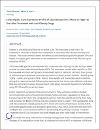Early Hepatic Gene Expression Profile of Lipid Metabolism of Mice on High Fat Diet after Treatment with Anti‐Obesity Drugs
Date
2020-04-17Metadata
Show full item recordAbstract
Obesity is a multifactorial disorder of global scale. The liver plays a vital role in fat metabolism. Disorder of hepatic fat metabolism is associated with obesity and fatty liver disease. This study aimed to detect the effects of anti‐obesity drugs (sulforaphane; SFN and leptin) on hepatic gene expression of fat metabolism in mice that were fed HFD during an early time of DIO.
Thirty‐two wild type (WT) ten‐week‐old CD1 male mice were fed high fat diet for four weeks in order to induce diet‐induced obesity (DIO). The mice were treated with a vehicle, or SFN for one week and then each group is treated with leptin or saline for 24 hours. Four groups of treatment were obtained; control group (vehicle + saline), group 2 (vehicle + leptin), group 3 (SFN + saline), and group 4 (SFN + leptin). Body weight and food intake were monitored during the treatment period. Following the treatments, liver tissue was collected, and total RNA was extracted to assess the expression of 84 genes involved in hepatic fat metabolism using RT‐PCR profiler array technique.
Leptin treatment upregulated the genes involved in fatty acid beta‐oxidation (Acsbg2, Acsm4) and fatty acyl‐CoA biosynthesis (Acot6, Acsl6), and down‐regulated the fatty acid transport gene (Slc27a2). SFN upregulated acyl‐CoA hydrolase (Acot3) and long chain fatty acid activation for lipids synthesis and beta‐oxidation (Acsl1). Leptin + SFN upregulated fatty acid beta‐oxidation‐related genes (Acad11, Acam) and acyl‐CoA hydrolases (Acot3, Acot7), and downregulated fatty acid elongation gene, Acot2. As a result, treatment with both SFN and leptin has a more profound effect in ameliorating the pathways involved in hepatic lipogenesis and TG accumulation and body weight gain than other types of intervention.
We conclude that early intervention of obesity pathogenesis could ameliorate the metabolic changes of fat metabolism in the liver, as observed in mice on HFD in response to SFN anti‐obesity treatment.
DOI/handle
http://hdl.handle.net/10576/17830Collections
- Biomedical Sciences [829 items ]


